
EuroIntervention
Scope & Guideline
Connecting Research and Clinical Excellence in Cardiology
Introduction
Aims and Scopes
- Transcatheter Aortic Valve Implantation (TAVI):
The journal frequently publishes studies on TAVI, exploring its effectiveness, complications, and advancements in valve technology. - Percutaneous Coronary Intervention (PCI):
Research on PCI techniques, including stenting, drug-coated balloons, and the management of complications, is a core focus area. - Innovative Devices and Techniques:
The journal highlights novel devices and methodologies, such as robotic assistance in procedures, and new stent technologies. - Clinical Outcomes and Predictive Models:
Studies assessing the long-term outcomes of various interventions and the development of predictive models for patient outcomes are prevalent. - Antithrombotic Therapy:
Exploration of antithrombotic strategies, including dual antiplatelet therapy (DAPT) and its implications in different patient populations. - Valvular Heart Disease Interventions:
Research on interventions for mitral and tricuspid valve diseases, including edge-to-edge repair techniques, is also prominent.
Trending and Emerging
- Hybrid Approaches to Treatment:
There is a growing interest in hybrid therapies that combine surgical and percutaneous methods, particularly in complex cases involving multi-valvular disease. - Use of Artificial Intelligence (AI):
AI applications in predicting outcomes, optimizing procedures, and enhancing imaging analysis are increasingly featured in recent publications. - Patient-Centric Approaches:
Research focusing on patient-reported outcomes, shared decision-making, and personalized treatment plans is on the rise, emphasizing the importance of patient preferences in clinical practice. - Long-term Durability of Devices:
Studies investigating the long-term performance and outcomes of newer devices, especially bioresorbable scaffolds and advanced stenting platforms, are gaining traction. - Management of Non-Obstructive Coronary Artery Disease (MINOCA):
An increasing number of studies are focusing on the diagnosis and management strategies for MINOCA, reflecting a shift towards understanding this complex condition.
Declining or Waning
- Traditional Surgical Techniques:
There has been a noticeable decrease in publications focused solely on traditional surgical interventions, as the field shifts towards less invasive, transcatheter approaches. - Conventional Imaging Techniques:
Research dedicated to older imaging modalities is waning in favor of advanced intravascular imaging techniques like optical coherence tomography (OCT) and intravascular ultrasound (IVUS). - General Antithrombotic Guidelines:
Specific guidelines that do not account for individual patient risk profiles are becoming less common, as personalized medicine approaches gain traction. - Single Antiplatelet Therapy:
There is a declining emphasis on the use of single antiplatelet therapy, especially in high-risk populations, with more focus on tailored DAPT strategies. - Pharmacological Approaches in Isolation:
Research that does not integrate procedural techniques with pharmacological management is becoming less frequent, as a more holistic approach is favored.
Similar Journals
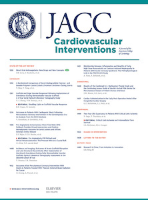
JACC-Cardiovascular Interventions
Connecting Research and Practice in Cardiovascular MedicineJACC: Cardiovascular Interventions is a premier journal dedicated to the field of cardiology and cardiovascular medicine, published by Elsevier Science Inc. This esteemed journal, with an ISSN of 1936-8798 and an E-ISSN of 1876-7605, has established itself as a leading platform for disseminating cutting-edge research and advancements from 2008 to the present, and is projected to continue until 2024. Recognized for its rigorous peer-review process and high-quality content, JACC: Cardiovascular Interventions holds a prestigious Q1 ranking in both Cardiology and Cardiovascular Medicine as well as a Q1 ranking in the broader category of Medicine (Miscellaneous) as of 2023. With a Scopus rank of #25 out of 387 in its field, placing it in the 93rd percentile, the journal is a vital resource for researchers, healthcare professionals, and students alike. Although it does not currently offer open access, its essential contributions to the medical community underscore its importance in advancing cardiovascular intervention knowledge and practice.
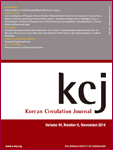
Korean Circulation Journal
Advancing Cardiovascular Knowledge, One Study at a Time.Korean Circulation Journal, published by the Korean Society of Cardiology, has established itself as a prominent platform for disseminating research in the fields of Cardiology and Cardiovascular Medicine. With an ISSN of 1738-5520 and an E-ISSN of 1738-5555, this journal has been at the forefront of cardiovascular science since its inception in 2006 and is projected to continue until 2024. The journal's commitment to quality is reflected in its 2023 category quartiles, ranking in the second quartile (Q2) for both Cardiology and Internal Medicine, as well as its commendable Scopus rankings within the respective fields. Located in South Korea, the journal aims to bridge the gap between cutting-edge research and practical applications, serving as an invaluable resource for researchers, healthcare professionals, and students keen on advancing their understanding of cardiovascular health. Although currently not an open-access journal, it provides a wealth of knowledge that encourages evidence-based practice in clinical settings.
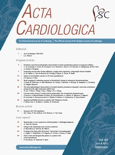
ACTA CARDIOLOGICA
Charting the future of heart health and medicine.ACTA CARDIOLOGICA is a distinguished journal published by TAYLOR & FRANCIS LTD, focusing on the dynamic fields of Cardiology and Cardiovascular Medicine. Established in 1946, the journal has maintained a significant presence in the academic community, providing a platform for cutting-edge research and clinical studies that aim to address challenges in cardiovascular health. With its Q3 rating in both Cardiology and General Medicine categories, it showcases a robust compilation of articles that reflect the evolving landscape of cardiac care. Although ACTA CARDIOLOGICA is not an Open Access journal, it continues to serve a vital role for researchers, professionals, and students dedicated to advancing knowledge in cardiovascular health. This journal, with an ISSN of 0001-5385 and E-ISSN of 1784-973X, is a critical resource for those looking to stay updated on the latest developments and practices in the specialization, contributing significantly to the field until 2024 and beyond.

JOURNAL OF INVASIVE CARDIOLOGY
Empowering Cardiology Through Rigorous ScholarshipJOURNAL OF INVASIVE CARDIOLOGY, a reputable publication by H M P COMMUNICATIONS, is dedicated to advancing the field of cardiology and cardiovascular medicine through rigorous research and scholarly discussion. With an ISSN of 1042-3931 and an E-ISSN of 1557-2501, this journal serves as a crucial resource for healthcare professionals, researchers, and students who seek to stay informed about the latest findings and innovations in invasive cardiology. Having achieved a 2023 Scopus rank of #185 out of 636 in General Medicine, placing it in the 70th percentile, the journal is recognized for its significant contributions to medical science, evidenced by its Q2 ranking in Radiology, Nuclear Medicine and Imaging, and Q3 status in both Cardiology and Cardiovascular Medicine. The journal has been in circulation since 1990 and continues to foster a platform for critical research in the United States, ensuring accessibility to vital information necessary for enhancing patient care and clinical practices within the domain of invasive procedures.
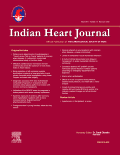
Indian Heart Journal
Fostering Global Collaboration in CardiologyIndian Heart Journal, published by Elsevier, is a distinguished peer-reviewed journal dedicated to the field of cardiology and cardiovascular medicine. Founded in 1961, this journal has been a pivotal resource for researchers, healthcare professionals, and students, providing a platform for innovative studies and insights into heart health. The journal transitioned to an Open Access model in 2013, ensuring widespread dissemination of vital research findings to enhance global understanding of cardiovascular diseases. Ranked in the Q3 category for Cardiology and Cardiovascular Medicine in 2023, it holds a reputable position in the medical community, with a Scopus rank of #222 out of 387 journals in the same field, placing it in the 42nd percentile. The Indian Heart Journal strives to foster advances in clinical practice and research while addressing the unique cardiac health challenges faced in India and beyond.

Nepalese Heart Journal
Elevating Cardiology Practices in Nepal and BeyondNepalese Heart Journal, published by the CARDIAC SOC NEPAL, serves as a premier platform for disseminating knowledge in the field of cardiology and cardiovascular health. With an ISSN of 2091-2978, this journal aims to bridge the gap between researchers, clinicians, and academicians by presenting high-quality, peer-reviewed articles that address clinical practices, innovative research, and emerging trends in heart disease management, especially within the context of Nepal and the surrounding region. Although it operates under a traditional publishing model, its commitment to excellence aids in reinforcing the scientific discourse in an area critical to public health. The journal is a valuable resource for professionals and students alike who are focused on advancing their understanding of cardiology and its implications for health policy and practice. Exploring the intersections of local challenges and global advancements in heart health, the Nepalese Heart Journal is poised to contribute meaningfully to the evolving landscape of cardiovascular research.
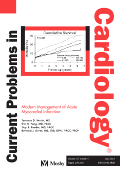
CURRENT PROBLEMS IN CARDIOLOGY
Pioneering Solutions for Modern Cardiovascular IssuesCURRENT PROBLEMS IN CARDIOLOGY is a leading peer-reviewed journal published by MOSBY-ELSEVIER, dedicated to advancing the field of cardiology through comprehensive analyses of contemporary challenges faced by cardiovascular practitioners. With its ISSN 0146-2806 and E-ISSN 1535-6280, this esteemed journal has been a crucial resource for researchers, clinicians, and students alike since its inception in 1976, and continues to publish groundbreaking studies and reviews up until 2024. As a testament to its scholarly impact, CURRENT PROBLEMS IN CARDIOLOGY boasts a prestigious Q1 ranking in both Cardiology and Cardiovascular Medicine, as well as in the broader category of Medicine (miscellaneous) in the 2023 metrics, positioning it among the top journals in its field. With a Scopus ranking of #127 out of 387 in Cardiology, and a 67th percentile ranking, it remains a vital platform for disseminating high-quality research that addresses critical issues in cardiovascular health. Researchers and practitioners looking to stay at the forefront of cardiac medicine will find this journal an indispensable tool for informed decision-making and practice improvement.
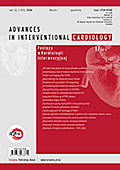
Postepy w Kardiologii Interwencyjnej
Unleashing knowledge in interventional cardiology for a healthier tomorrow.Postepy w Kardiologii Interwencyjnej is a prominent scholarly journal dedicated to the field of interventional cardiology, published by the esteemed TERMEDIA PUBLISHING HOUSE LTD. Since its transition to an Open Access model in 2005, this journal has provided a platform for the dissemination of valuable research and clinical insights, reaching a broad audience of researchers, healthcare professionals, and students in Poland and beyond. With an ISSN of 1734-9338 and E-ISSN of 1897-4295, the journal has established its relevance by featuring articles that are currently indexed in Scopus, reflecting its impact in the field, particularly with a rank of #269 out of 387 in the category of Cardiology and Cardiovascular Medicine for 2023. The publication has continuously evolved to meet the demands of the scientific community, making it an essential resource for staying informed about the latest advancements in interventional techniques and cardiology research. With its commitment to enhancing the knowledge base of cardiovascular medicine, Postepy w Kardiologii Interwencyjnej plays a critical role in fostering collaboration and innovation within this vital specialty.
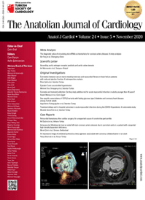
Anatolian Journal of Cardiology
Unlocking the Future of Cardiology Through Open Access Research.The Anatolian Journal of Cardiology, published by KARE PUBL, stands as a vital resource in the field of Cardiology and Cardiovascular Medicine. With an ISSN of 2149-2263 and E-ISSN 2149-2271, this Open Access journal has been fostering the dissemination of critical research since 2001, ensuring that high-quality content is freely available to a global audience. Based in Turkey, the journal aims to bridge gaps in cardiological knowledge through rigorous peer-reviewed articles that span a wide range of topics, from innovative clinical practices to groundbreaking research findings. While its current ranking places it in the Q3 category of cardiology journals, the Anatolian Journal of Cardiology continues to strive towards enhancing its impact, currently holding a Scopus rank of 236 out of 387. Researchers, practitioners, and students alike will find this journal an essential platform for keeping abreast of the latest developments in cardiovascular health.

Cardiology Journal
Innovating the landscape of cardiovascular medicine.Cardiology Journal, published by VIA MEDICA, stands as a prominent resource in the field of cardiology and cardiovascular medicine, with an ISSN of 1897-5593 and an E-ISSN of 1898-018X. Recognized for its Open Access model established since 1994, this journal facilitates widespread dissemination of critical research findings, allowing practitioners and researchers globally to access valuable insights without barriers. Based in Poland, with an address at UL SWIETOKRZYSKA 73, 80-180 GDANSK, it has achieved a respectable Q2 classification in 2023 for both Cardiology and Miscellaneous Medicine categories, reflecting its influence and quality within the scholarly community. With a Scopus ranking placing it at #117 out of 387 in Cardiology, it lies within the 69th percentile, underpinning its commitment to advancing knowledge in cardiovascular health. The journal’s converged years extending from 2006 to 2024 ensure it captures ongoing developments in a rapidly evolving field. As such, the Cardiology Journal serves as an indispensable platform for researchers, professionals, and students dedicated to exploring the frontiers of cardiac science and improving patient care.